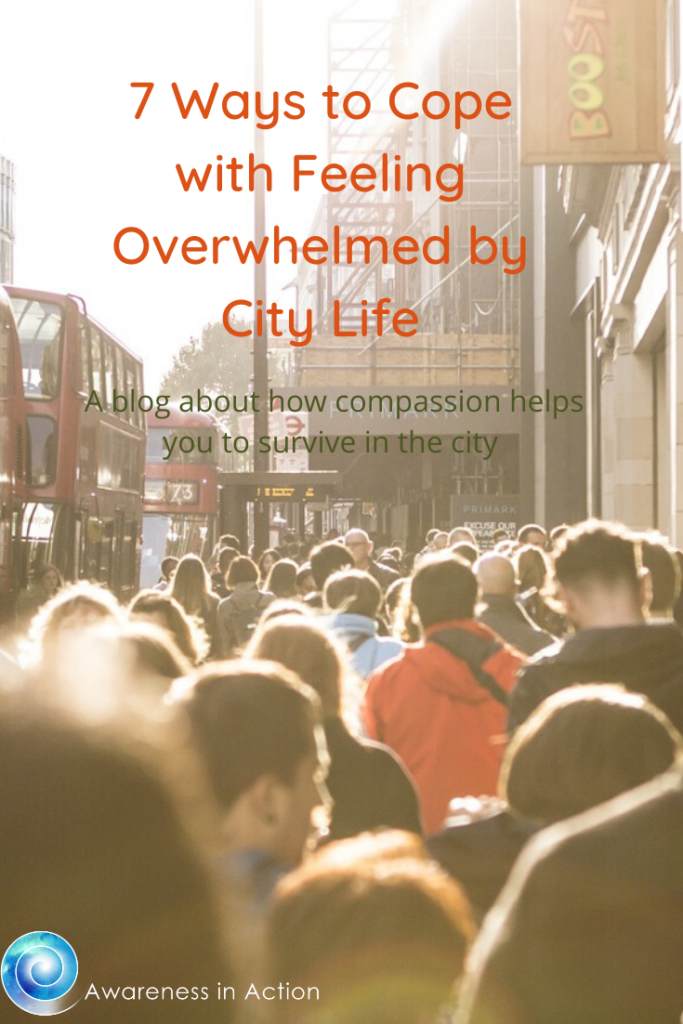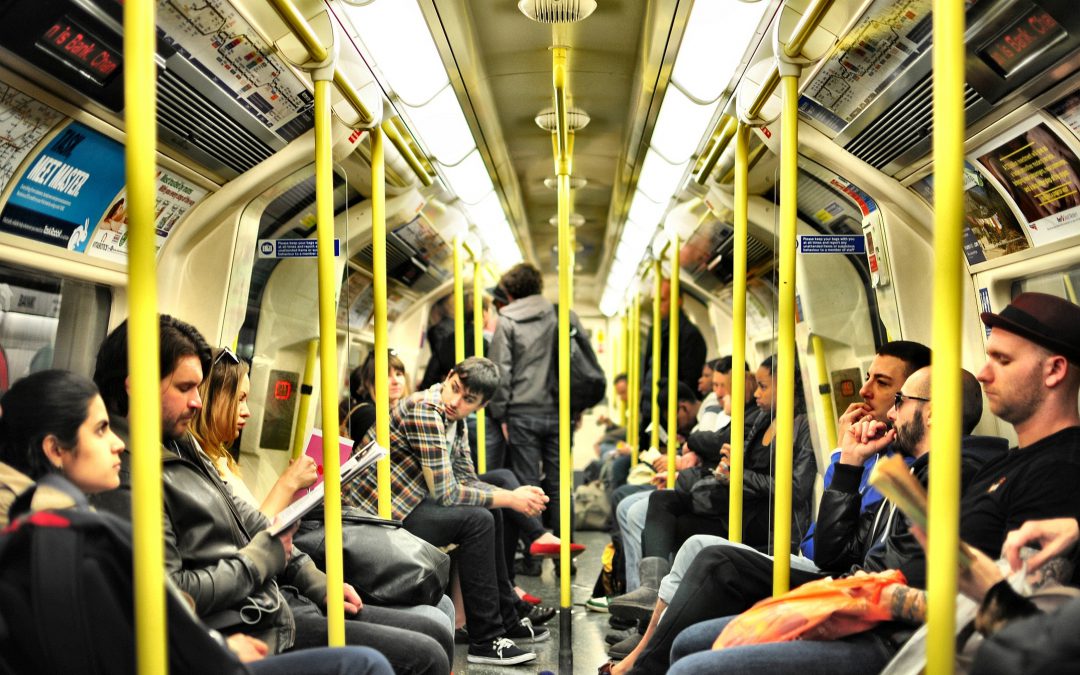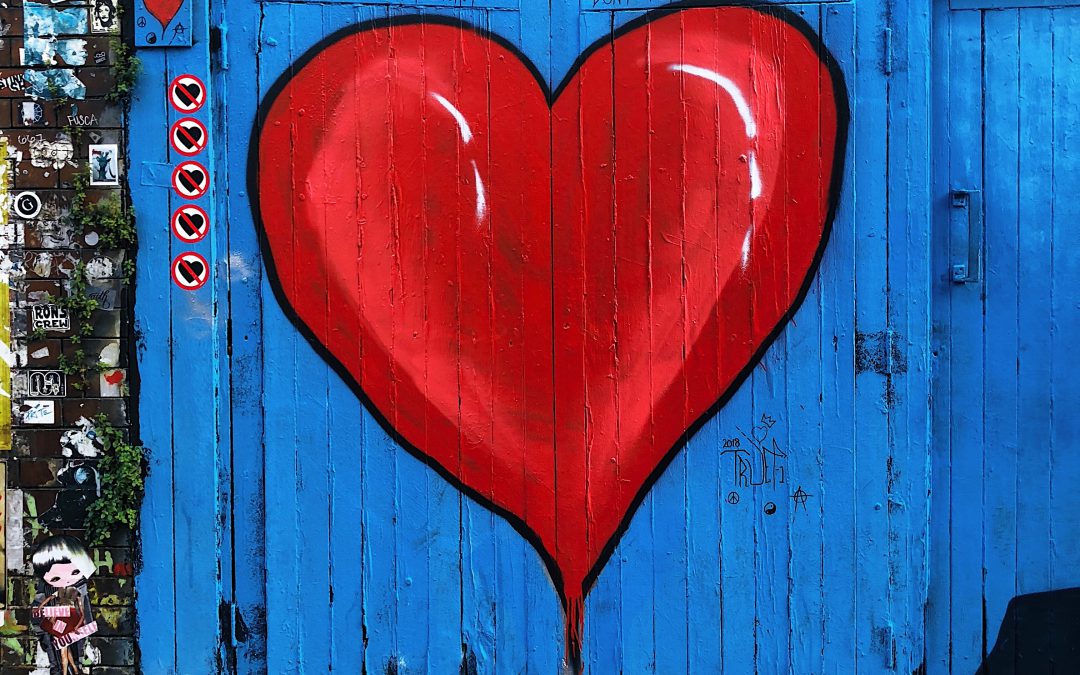
7 Ways To Cope With Feeling Overwhelmed By City Life
We have all been there. Those moments when city life feels too full—too many people, too much noise, too much everything. We long for some peace and quiet and a chance to regroup.
For most of us the immediate answer is not a holiday. We have families to care for, and bills to pay. That means we need to be able to work with our feelings of being overwhelmed by the city from within ourselves—to find inner space even when there does not seem to be any on offer.
When we feel overwhelmed it’s easy to withdraw, to close in on ourselves and try to put up a wall. This tends to solidify our feelings and cut us off from managing our feelings. To cope with feeling overwhelmed in the city in the long term, we need to be more daring.
Here’s some things we can try.
1. Take a moment
Think about how you begin your day. You jump out of bed to get started on the list of things that need to be done—get ready for work, hurry the kids up for school. You rush into the shower but instead of being present in the running water and enjoying the moment, you are thinking of that conversation you had with your boss the day before or worrying about getting your son to the dentist after school.
Research carried out at Harvard University in 2010 showed that for almost half of our waking hours we are thinking about something different from what we are doing. In other words, we are not fully present for many of our actions. This means that we are neither bringing our full resources, or, appreciating the moment we are experiencing. As life is uncertain, the only moment we can be sure of is the present moment—so it is ironic that we so frequently miss it.
On top of that, we plan our days with lists of things that need to be done and then assess ourselves on how far we have accomplished them. We rarely take a moment to simply allow ourselves to be. Often, we neglect the importance of simply being in order to put all our attention into doing.
Try to break up your day by taking short moments to nourish yourself. City life offers many good times to do this are when you are on tram, or bus, waiting in the queue at the supermarket, or changing from one activity to another.
- Pause in what you are doing
- Bring your attention to your body
- How do you feel?
- What is your mood?
- Take a few slow, deep breaths
- Feel the richness of the moment you are living right now
- Continue with what you were doing
2. Stay open and curious
City life offers many opportunities to be open and curious. When you are going about your day you pass all kinds of people, lots of different activities and situations. Perhaps there are buskers in the metro, maybe you see a mother struggling to get her small children on to a tram or a bunch of visiting students laughing and excited about their visit to your city.
Cities are usually vibrant places with lots of energy. When we are tired or stressed it can be hard to go with the flow. We want to shut ourselves off from the noise and bustle. Instead, if we are being present, we can simply see what is happening around us. It’s not necessary to get into all kinds of opinions and judgements—we can just notice. We can stay open to new experiences, to new ideas and let them unfold around us without resisting. That way the activity can nourish and engage us, instead of exhausting us.
- Try taking the time to look about you.
- Look up, rather than looking down at the sidewalk.
- Notice the changes that happen with the seasons.
- Be curious about anything different that you see.
- Look out for what intrigues you.
- Allow yourself to connect instead of withdrawing.
3. Be patient
Do you remember when you were a child being told, ‘Patience is a virtue’? It sounded really boring, didn’t it? Certainly, not a way to get what you want and to cut through the crowd. It took me a long time to appreciate the value of patience and to recognise the extent to which it eases stress.
There are so many moments in an average day in a city life where impatience can flare up—standing in line in a shop, waiting your turn in a café only to have someone barge in ahead of you. When everyone is in a hurry there are so many moments where people can act thoughtlessly—walking in big groups on the sidewalk, pushing you out of their way to get past. An angry reaction can rear up even when we are in a good mood—if we are tired, or worried it happens even easier.
The thing is, going with our impatience is exhausting and the emotions that impatience stirs up, such as anger and resentment, are not good for us. They increase our stress levels and can lead to higher blood pressure and heart problems. Positive emotions like kindness and tolerance, on the other hand, do promote wellbeing.
Being able to respond to challenging situations with patience is not a passive activity. It requires self-awareness and a capacity for seeing things from other people’s point of view. It involves flexibility and a degree of openness.
Next time your patience is challenged:
- Try taking a moment to come home to yourself
- Open up your awareness to view the whole situation you are in
- Be aware of the needs of other people around you
- Don’t focus exclusively on your own agenda
- Engage your sense of humour
4. Do something for someone else
A couple of weeks ago I was on my way home and feeling pretty tired. It was a relief when the tram showed up. As it happened, I had a lot on my mind. A work project I was working on was taking much longer to compete than I had anticipated, and it was causing me concern. Out of the corner of my eye I noticed a young mother with two small children—a toddler and a baby. I didn’t pay so much attention because of the problem I was working with in my mind.
It turned out that we got off at the same stop and the mother had all the struggle of collecting her buggy and getting the baby into it. As they moved off, I noticed that one of the children had dropped a soft toy on the pavement. Everybody was too busy to see. Luckily, I could pick it up and return it before it got trampled. The toddler say the toy and grabbed for it joyfully—it must have been a favourite—and the mother gave me a grateful smile.
In those short moments, my mood changed completely. I went from being self-focused and worried to feeling a great sense of wellbeing. Taking a moment to help someone else lightened my mood and helped me to feel less oppressed by my own concerns.
5. Smile
It’s all too easy as you go through an average day in your city life to put your head down and carry on. We are busy and we want to get on with what we have to do.
Even if we don’t see an opportunity to do something for someone else, we can at least smile. There is more to smiling than we think. It helps us to feel more open and accessible and it is pleasant for other people too.
6. Be grateful
Research is showing that people who make gratitude an active part of their lives are happier. It’s relatively easy to feel grateful for big things like promotion or moving to a new house but it’s harder to feel grateful on a daily basis.
If we look around and pay attention there is plenty that we can find to be grateful for in city life. Noticing the richness that we have in our lives is nourishing and will help us to feel stronger and more able to cope.
Here’s some ideas:
- Before you go to sleep think of something that happened in your day that you feel grateful for
- Keep a gratitude journal
- Have a gratitude jar in the kitchen where everyone can contribute
- Hold a gratitude session once a week with your family, where each person shares something that they were grateful for during the week.
7. Remember common humanity
It helps to remember that all the people in your street, in your neighbourhood, in your city want to be happy and they don’t want pain. It’s a fact of life. Maybe some people have strange ways of trying to be happy, but they still do. The longing for happiness is part of being human. Yet we all know that life can be hard and difficult times come for all of us. When city life seems too much to handle, remember to see all the people as a collection of individuals—who will have a lot in common with you on a fundamental human level.
Here’s a simple exercise you could try.
- Pay attention to the people you pass in the street
- Notice if you make a comment in your mind about someone
- Be aware of the people you feel drawn towards and the ones you do not like the look of
- Try to imagine how they might see you as you pass them by
- Take a moment to be aware that everyone you see wants their day to go well and to avoid any unpleasantness
—just as you do - Then realize that inevitably for some people things will go wrong during the day
—let that feeling touch you and help you to feel a common humanity with your fellow travellers.

You might be interested in this new zoom+online course which starts on 15 June 2021 HOW DO YOU WANT TO FLOURISH IN YOUR RIPE OLD AGE?
Awareness in Action is dedicated to building a community of people interested in living a life of meaning and purpose based on sustainable wellbeing. If you would like to join with us, you could make a start by sharing and commenting on the ideas you find in the blogs on these pages. Your story is part of our journey.


How To Take a Fresh Look at Your Commute
How do you use your commute time?
Do you cycle to work, or drive in your car? Maybe you take a tram, or bus? Perhaps you use the metro or ride a train. Whichever way you make the journey, your commute is a solid chunk of time twice a day, every working day. You’re not at home but you’re not in work either. The time is your own but not really. You’re free to be as you wish but within strict parameters. On the way in to work, the tasks of the day are already pressing for your attention. On the way home, anticipating a pleasant evening competes with processing what has gone on during the day.
Maybe we choose to use the time travelling to fend off the thought of the working day ahead by catching up on some good reading. Perhaps we shut ourselves off from the crowd by turning up the volume on our headphones. I hear of an increasing number of people who watch Netflix during their journeys. Alternatively, we could use this time to steal a march on our working day by scanning through our emails on our phone, or tablet and running through the schedule for the day.
Taking a fresh look at your commute
Here’s another idea—to take charge of this time by yourself and use it for your wellbeing.
In research carried out in 2010 at Harvard University it was found that people spend almost 50% of their time thinking about something different to what they are doing and that it undermines their happiness. One of the most common times when people were ruminating in this way was on their commute.
So how do we take a fresh look at our commute?
A lot of the people that I work with, who are interested in making meditation part of their lives, find it difficult to make the time they need for meditation. Quite a few are experimenting with using their commute as a time to do a meditation session. Some use a meditation app and listen to a guided meditation. Others simply wait to find a seat, and then sit quietly and focus on their breath.
Here is a very simple way to do this.
Try being mindful and come home to yourself
- Take a few moments to check in with your breathing—pay attention to the sensation of your breath entering and leaving your body
- Notice how your body is feeling—do you have any places that feel tired, or weary, or are you feeling fresh and up for anything?
- Check in on your mood—are you feeling good about the day ahead, or is there something worrying you?
- Try to become aware of the thoughts passing through your mind—notice how quickly they change and turn into other thoughts
- Just register all this—try not to get drawn into feelings of liking, or not liking any of it.
What does this accomplish?
When we connect with ourselves in this way we are tuning into the present moment and getting in touch with how things are for us. We try to do this without judgement, without wanting to change anything—just with the aim of coming home to ourselves and settling our minds.
This will help us to move into our work situation in a more relaxed and stable mood ready for whatever comes our way. On the way home, it helps us to shake off the concerns of the day and get ready to spend an evening with our friends and family.
Consider other people as just like you
So much of the stresses and strains of the day come about during our interactions with other people. Often, we focus on the things that separate us from others, when in fact, there is a great deal that we all have in common.
If you still have time on your journey, try to turn your attention to your fellow passengers.
- Notice who your neighbours are—take a few moments to scan the compartment, tram or bus and to see as many of the other passengers as you can.
- Take note of the thoughts and emotions that pass through your mind as you do this:
—notice if you make a comment in your mind about someone
—notice the people you feel drawn towards and the ones you do not like the look of
- Try to imagine how they might see you as you sit, or stand alongside them
- Take a moment to be aware that everyone travelling with you wants their day to go well and to avoid any unpleasantness
—just as you do
- Then realize that inevitably for some people things will go wrong during the day
—let that feeling touch you and help you to feel a common humanity with your fellow travellers.
What does this accomplish?
Reflecting in this way reminds us that everyone wishes for a happy life and wants to avoid pain and suffering but that pain and suffering are an inevitable part of life. Coping with all this gives a common thread to all our experiences. It enables us to see that however different our interests are, we are all in the same boat. This can help us to develop a feeling of equanimity towards others as we engage in our working day.
It’s up to us
Of course, sometimes we just want to read, or listen to music and that’s completely fine but we do have the option to take a fresh look at our commute. We can prioritise self-care and use this limbo-time in our day to develop our mindfulness—both of ourselves and of others. Spending a bit of time each day in this way will help us to deal with our work from a less stressful perspective. It will also help us to actually relax and enjoy our time when is over for the day.
Do drop a comment in the comment section and let me know if you have tried meditating during your commute and how you got on with it.
If you found this post useful you might like to check out our free 5-day e-course
HOW TO MAKE YOUR COMMUTE BENEFIT YOUR WORKING DAY

How to Follow the News Without Going Crazy
As the Beatles sang in their song, A Day in the Life,
I read the news today, oh boy….
As I read the news, the main headline was about the ‘final call’ to save the world from ‘climate catastrophe’—in other words, everyone and everything frying in less than 30 years time. There was a piece about girls in school uniform being sexually harassed, and another about increasing homelessness even in prosperous cities in the USA. Another right-wing candidate has leapt to prominence, and the incidents of PTSD among veterans is seriously on the rise. Young people who have enough money for a 10% deposit on a house still cannot afford to buy one. Then the usual stories of bribery, corruption, and the misery of long-term refugees is like a familiar backdrop to the daily round of suffering, violence and natural disasters.
Quite a lot of my friends have stopped watching the news. They say it is way too distressing, and makes them feel powerless, frightened and miserable. Why put yourself through it—it’s enough to make you crazy?
So why do I risk the news driving me crazy and keep watching it so regularly?
Common humanity
Something that comes into my head over and over again as I struggle with watching the news is that any one of the people I am watching could be me—I could be flooded out of my home or attacked by a terrorist while moving about the city. I am one of the people directly affected by Brexit, new tax regulations and the housing shortage. It seems vitally important to realize that each of the news stories are made up by people just like me. We might live in different countries, have different interests and concerns but each of us needs basic shelter, enough to eat and a way to earn our living. We all have hopes and dreams and we all experience crushing disappointments, anxieties and fears. Somewhere, at some level we all want and need love.
Putting myself in their shoes
As I watch the news I try to put myself in the shoes of the people involved – to see things as they are experiencing them. This is not the same as letting myself get overwhelmed by what is going on. It’s more like walking a bit on someone else’s shoes until I get their feel and then putting my own back on. I know it will not help anyone if I just feel bad and miserable. The point for me is not to withdraw but to see it all within the scope of how inter-connected we all are – to keep my own heart open and responsive, to dare to be vulnerable.
It gets a lot harder if I try to put myself in the shoes of the perpetrators of terrorism, or conflict, or crime and sometimes it is just not possible. At the very least, I make an attempt to fathom what led them to act as they did—to ask myself what suffering they may have experienced that led to such drastic action.
Dealing with judgement
We seem to be living through a time of deep polarization between different opinions and ways of seeing the world. It is all too easy to judge those we disagree with as being less capable, less honest, almost less human. It hurts to see legislation, political appointments and decisions that go directly against what you yourself feel to be important. At such times it’s easy to feel cynical and dismiss it all as just another manifestation of how hopeless it all is and how we should not even try to make sense of any of it.
I was struck by a recent video I watched from Michelle Obama in which she encourages people to get out and vote—to take responsibility for how they want to live. She did not urge people to vote democrat—she simply encouraged people not to go passive in the current melée of politics but to engage and choose. Her insistence that it is fundamentally up to us resonated with me.
Managing my dislike
I confess to feeling angry, frustrated and overwhelmingly sad when certain politicians come on the screen—I just need to hear their voice, or see their name and my reaction rolls in. It surprises me how visceral it is. Generally my preference is for dialogue, kindness and compassion and yet when these particular political figures appear on the screen I just want to yell abuse.
This cannot be called a productive response at any level.
Perhaps one of the main reasons for this reaction is my sense of helplessness—I want to hit back because of how frustrated I feel. Just lately, it has been becoming clearer that if I can manage my exactions with more equanimity, less dislike and less judgement I can feel that I am taking back some control of the situation. A meditation teacher of mine used to say, If you want to bring about nuclear disarmament, start off with the atom bomb in your own heart. The wisdom of this is finally beginning to filter through.
Just as Michelle Obama encourages participation as a way of taking responsibility, so working with my reactions—from aversion, through judgement to dislike—can help me to have more resources and energy to see the new items more clearly. This can only help in developing the understanding and compassion I am looking for.
Bearing witness
Watching the news has become a way of bearing witness for me—bearing witness to the pain and suffering in the world, to the struggles that we all have to manifest our natural capacity for kindness and to my own path to developing my resources in order to be of benefit, rather than adding to the chaos and confusion.
Hello! If you enjoyed this blog and want to go deeper, you might enjoy this online course: How to Be a Good Friend to Yourself
https://www.awarenessinaction.org/be-a-good-friend-to-yourself-emg/
Photo credits
Photo by Elijah O’Donell on Unsplash
Photo by Randy Colas on Unsplash
Photo by Nitish Meena on Unsplash
Photo by Jordy Meow on Unsplash

How to Survive Bad Times with an Open Heart
In the UK three out of 4 people have been so stressed at least once over the last year that they have felt overwhelmed, or unable to cope.
This statistic is from a recent report for the Mental Health Foundation which shows astonishingly high levels of stress. Isabella Goldie, director of the Foundation is quotedas saying, Millions of us around the UK are experiencing high levels of stress and it is damaging our health. Stress is one of the great public health challenges of our time but it is not being taken as seriously as physical concerns.
With Mental Health Awareness Week focusing this year on stress, there has been quite a bit of media attention around stress-related issues. As someone who has been going through a bit of an intense time recently, it got me thinking about how meditation helps with working with stress.
Seeing the problem
During a particularly hectic day a couple of weeks back, a friend messaged me wanting to talk through a problem she was having with someone in her family. I did my best to be there for her. I listened, I responded but slowly it crept up on me that I was having to try really hard to have an open heart because none of it seemed as challenging as my own bad time. I was almost resentful that she kept going on about it all! That was a bit of a shock. It brought home to me that somehow what I was dealing with was intense enough to affect my open heart. I needed to re-apply my attention to how I was applying my meditation practice in action.
Here are some of the ways I have been trying to work with managing bad times in a way that enables me to maintain an open heart—a heart that is open and available to what is going on for others, rather than being focused primarily on what is going on for me.
1. Respecting people’s wish for happiness while understanding suffering
It’s natural when you feel down to want to feel better. You just want to be happy and to get on with life. The key thing to remember is that is exactly how everyone else feels as well. Just about everyone we meet wants to be happyand not to experience suffering and pain. We would like things to go well for us and for us not to have to face disappointment, loss, and grief. We work hard to try and avoid having to face things we don’t like and don’t want.
Life shows us clearly that while there is nothing wrong with the wish to be happy it is not as easy as we might hope. No amount of money, possessions or fabulous holidays will protect us from the challenges that life can bring. Every day each one of us is getting older, sometimes we get sick and one day, eventually, we will die.
The truth is that suffering is part of life. We won’t manage to live a care-free life! Nothing is permanent, everything is constantly changing. Our lives are made up of a string of moments that we weave together to try to make a whole, when in fact, we have no idea what each minute will bring. Just because we wake up each morning and go through our usual routine does not mean that the routine is cast in stone. Consider people having to flee their homes to escape, fires, or flooding or volcanic eruptions.
None of this means that we should not seek happiness but perhaps we can open our hearts to include everyone’s wish for happiness, not just our own. Perhaps also we can ease the intensity with which we long for happiness by accepting the inevitability of suffering. When we can acknowledge that things are tough, we give ourselves a chance to learn about what we are going through and how we could do things differently.
2. We are all in the same boat
All of this points to the fact that there is more that unites us as human beings than divides us. We might look different, with our own interests and dreams but joining us is a deep thread of common humanity. We all face worries about how we look, being in work, having enough money, finding love, caring for our families and staying healthy. In addition, we have strong imaginations and the ability to create worries simply from within in our minds. Anyone who has laid awake worrying at 04.00 in the morning will know what I mean.
As we have seen, we all look for ways to escape from our worries but it does not always work. As human beings we have to live with our imperfections, with our bodies that can seem so fragile and easily damaged and the impossibility of knowing all that we think we need to know.
Next time you are on a train, or tram, or plane try this exercise:
- Notice who your neighbours are—take a few moments to scan the compartment, tram or bus and to see as many of the other passengers as you can.
- Take note of the thoughts and emotions that pass through your mind as you do this:
—notice if you make a comment in your mind about someone
—notice the people you feel drawn towards and the ones you do not like the look of
- Try to imagine how they might see you as you sit, or stand alongside them
- Take a moment to be aware that everyone travelling with you wants their day to go well and to avoid any unpleasantness
—just as you do
- Then realize that inevitably for some people things will go wrong during the day
—let that feeling touch you and help you to feel a common humanity with your fellow travellers.
Doing exercises like this helps to remind us of how things are for other people. We are reminded of the deep thread of inter-connectionthat runs through all of human experience, and we are reminded that it is not just us who struggles. Realizing that just as we can be in pain, so can others can help to keep an open heart.
3. Helping others helps you
When we feel down, it can be hard to find the energy to do something for someone else but if we can make the effort, the benefits are considerable.
Research shows that kindness can improve heart function, lower blood pressure, slow aging and strengthen our immune systems. The author and scientist, David R. Hamiltonexplains that through the production of the hormone, oxytocin and the neurotransmitter, serotonin our levels of wellbeing are raised. Anxiety, stress and depression can all be reduced through preforming genuine acts of kindness. In his ground-breaking book, The Healing Power of Doing Good, Allan Luks documented the good feeling that you get from helping others and which is now referred to as the Helpers’ High.Older volunteers suffering from arthritis and other painful chronic conditions found that their symptoms decreased when they were actively helping others.
The thing is that when we can pay attention to the needs of other people, it lifts our attention to the bigger picture beyond our own individual bad time. Stress and worry tend to close us down, whereas thinking of others widens our view and ensures an open heart.
4. Build your resilience
For me the foundation of all of this is my meditation practice. I was drawn to meditation in the first place because I wanted to understand how my mind works. I can’t say that because I meditate I no longer worry about what might happen in the future or go over things that have already happened because I still do. The thing is that I take it all much less seriously than before. I have come to understand that there is a quiet, spacious aspect of my mind that worry covers over, and meditation enables me to access. On one level this can simply be being present to what is happening for me right now—recognising that all I can be sure of is the moment I am currently living. On a deeper level, it is an acceptance of my thoughts and emotions because I know that they do not have to define me—that my mind is bigger than they are. So even when I am facing challenges and bad times, a part of me trusts that I have sufficient resilience to bounce back from it in time.
The neuroscientist, Richard Davidson places resilienceas one of the four skills of wellbeing. When we are so stressed that we say or do something we regret later, or when we are so overwhelmed that we feel threatened by everything we need to cope with, we are experiencing an amygdala hijack. The amygdala is the brain’s radar for danger and the trigger for the flight-or-flight response. During a hijack it over-rides the brain’s executive centres in the pre-frontal cortex. Davidson’s research into the effects of meditation on the brain shows that meditation helps to strengthen the pre-frontal cortex and weaken the right-frontal cortex, which registers depression and anxiety.We now know from neuroplasticitythat the brain can change according to experience and research is confirming that we can learn to increase our resilience to hard times through a regular meditation practice.
What can we take from this?
Having an open heart is not something we achieve and then take for granted. Keeping our heart open is a process and sometimes it is going to be hard. Maybe we won’t always feel we can make the effort but if we want to manage our bad times with kindness, and wisdom then we don’t really have a choice. Our own wellbeing is dependent on maintaining an open heart because within that openness lies many of the solutions we need to work through our bad times.
Hello there!
If you enjoyed this post and want to go further try this online course
HOW TO BE A GOOD FRIEND TO YOURSELF


